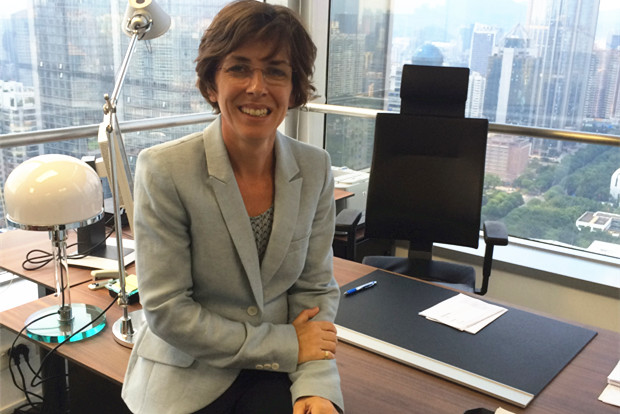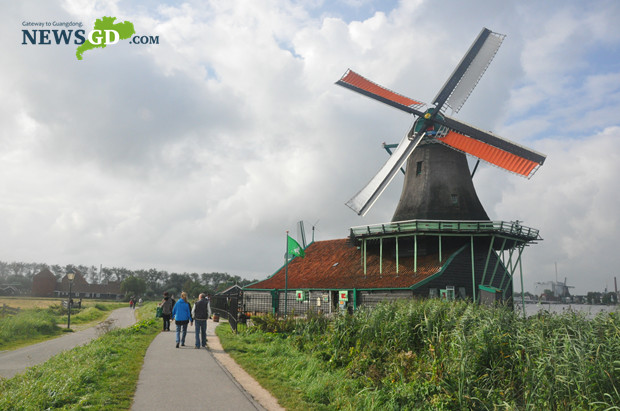Located at the two ends of Eurasia, the province of Guangdong and the Netherlands have been connected by the ancient Maritime Silk Road since 1600. Through the ancient Maritime Silk Road, “Made in Guangdong” products such as silk, porcelain and artworks were transported by sea from Guangdong to the Netherlands.
As time goes on, exchanges between Guangdong and the Netherlands are no longer limited to trading, but cover extensive areas, such as agriculture, finance and energy, especially regarding the Belt and Road Initiative.
2017 marks the 45th anniversary of diplomatic relations between China and the Netherlands, as well as the 20th anniversary of the Consulate General of the Kingdom of the Netherlands in Guangzhou.
In this very special year, Newsgd.com invited Mrs. Marjo Crompvoets, Consul General of the Kingdom of the Netherlands in Guangzhou, to talk about agricultural cooperation between Guangdong and the Netherlands.
Hi-tech is extremely important in agriculture sector
The agricultural sector plays an important role for Guangdong in building a prosperous society in a comprehensive way.
In order to make further efforts to develop agricultural modernization, last year, Deng Haiguang, Vice Governor of Guangdong led a delegation to the Netherlands, one of the top countries in the agricultural sector, to strengthen cooperation between Guangdong and the Netherlands in agrotechnology.
It is well known that the Netherlands is one of the top countries in developing agricultural modernization. Although the Netherland is a "low country" with insufficient sunlight and limited farming land, it is the second largest exporter of agricultural products, which is regarded as the “Dutch Miracle”.
Windmill, the landmark of the Netherlands, witnesses the agricultural development in the Netherlands.
"I would say that innovation, sustainability and cooperation are the key factors for the 'Dutch Miracles'," Mrs. Crompvoets introduced, “Hi-tech is extremely important in the agricultural sector.”
Since 25% of the land of the Netherlands is below sea level, while the others are poor in resources, the Netherlands chooses to establish a modern greenhouse system to make the best use of its limited farming land.
"The Dutch agricultural sector relies on hi-tech and good infrastructure," said Mrs. Crompvoets, "The greenhouse technology allows us to make optimized use of the land and enables the growing of crops."
According to Mrs. Crompvoets, the greenhouse can completely simulate natural environment, which is controlled by computer system automatically. In this environment, crops can grow up in a favorable natural condition with all adverse natural elements eliminated.
Apart from the hi-tech equipment, the Dutch agriculture also depends on "golden triangle", which is also the reason why the Netherlands has become the land of innovation.
Related story:
This region is not only the birthplace of Miffy, but also the land of innovation
"Team from 'golden triangle' will work together in certain sector, such as agriculture, food and energy," Mrs. Crompvoets indicated, "The agriculture sector depends heavily on the “golden triangle” that stands for a close cooperation among government, business and knowledge institutions, which can keep the agriculture business at the forefront."
In order to boost the development of agricultural modernization, in Mrs. Crompvoets' opinion, China ought to think highly of agrotechnology innovation, as well as technology brought by universities and businesses.
However, she also indicated that there was something that the Netherlands should learn from China. "Now in China, you can order most fresh agricultural products online and have it delivered within 24 hours," Mrs. Crompvoets said, "That is something that we can learn from China."
At present, Guangdong and the Netherlands have mature cooperation on flower and fertilizer industry. It is said that cooperation on agricultural modernization will be promoted between the two regions this year.
Three words are not enough for me to describe Guangdong
Mrs. Crompvoets has lived in Guangzhou for more than one and a half year, since she became the Consul General of the Kingdom of the Netherlands in Guangzhou in July 2015. It seems that she has already adapted to living in Guangdong. Like many local people, Mrs. Crompvoets likes the atmosphere of Spring Festival, and she also visits the flower market. For her, three words are not enough to describe Guangdong.

Mrs. Crompvoets became the Consul General of the Kingdom of the Netherlands in Guangzhou in July, 2015.
Mrs. Crompvoets said, "I should say vibrant, young and dynamic, this is one word for me. The second would be an enormous hunger for new things, and the third one is melting pot."
"Guangdong is extremely forward-looking and wants to move on," Mrs. Crompvoets added, "For melting pot, we can see that a lot of people from other provinces gather in Guangdong, which forms an extra energy to this province."
Meeting on the sea, the relationship between Guangdong and the Netherlands has developed well since 1600. Following the path of the ancient Maritime Silk Road, more exchanges and connections will be launched between the two regions in this special year 2017, especially regarding the Belt and Road Initiative.
Related story:
It is time to enjoy original Dutch culture in Guangdong
Currently, a daily direct flight has been operated between Guangzhou's Baiyun International Airport and Amsterdam's Schiphol Airport;
"And the connection between the port of Rotterdam and the port of Guangzhou and Shenzhen could be strengthened."
Besides the connection of sea and air, with the progress of the Belt and Road Initiative, the province of Guangdong and the Netherlands are connected by China Railway (CR) Express. As the railway network has gradually been put into use over the past five years, goods now can be transported from Dongguan to Rotterdam through the CR Express in about 20 days.
Apart from the cooperation on agriculture, the Netherlands and Guangdong are also exploring opportunities that will bring mutual benefits, Mrs. Crompvoets said “we are strengthening cooperation with Guangdong Provincial Association for Science and Technology and Guangdong Association of Circular Economy and Research Comprehensive Utilization in the field of chemical research and circular energy. Two universities and two companies from Guangdong and the Netherlands will work together on research and commercialize the outcome of research."
Written by Steven Yuen
Keane Wong and Abby Chen also contributed to this story

















